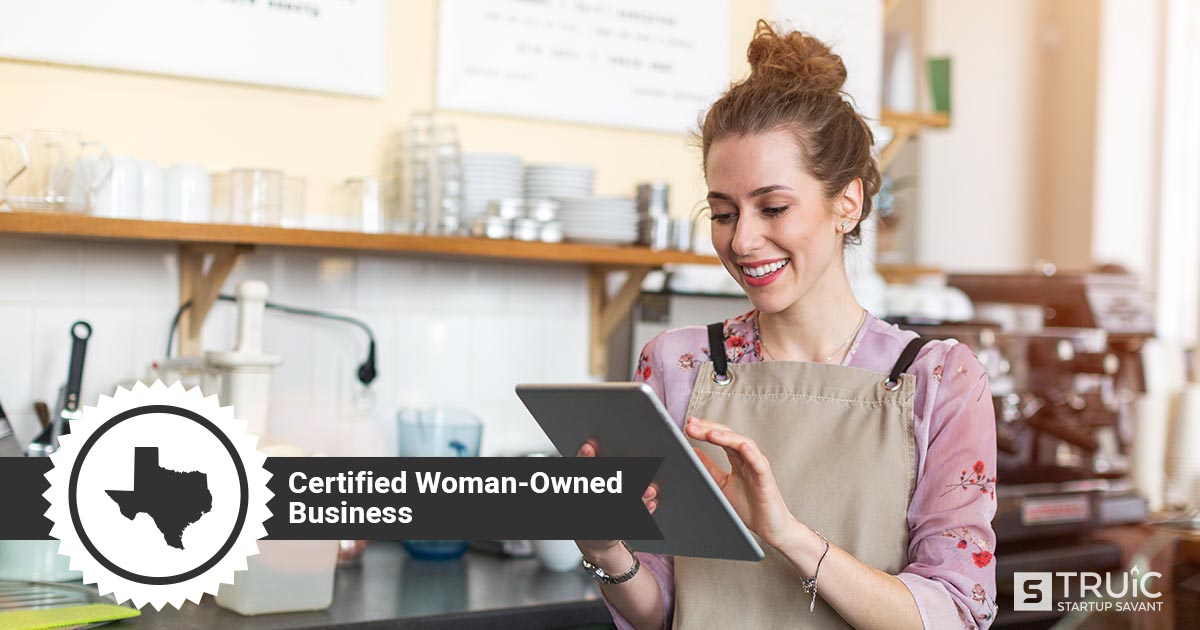Woman-owned Business Certification is an important option to consider for female entrepreneurs looking to scale their companies Texas— particularly for those who want to do more business with the federal government or corporate America.
While its benefits are abundant, women-owned business certification is not the most straightforward process — you have to meet specific qualifications and fill in a lot of paperwork. But fear not, we’ve broken down the ins and outs of certification in Texas, as well as the various businesswomen resources unique to your state, to make this as painless as possible and help you take this big next step.
How To Use Our Guide:
We've narrowed down the Women-Owned Business certification process. There are many resources (e.g. WBE or SBA) that will help with your application.
Follow our guide to learn more about how to become a certified Woman-Owned Business in Texas.
What Is a Certified Woman-Owned Business?
The origin of certification programs can be traced back to 20 years ago when researchers revealed the severe lack of corporate and government agencies contracting with women-owned businesses. The U.S. government reacted with a goal to award “at least five percent of all federal contracting dollars to women-owned small businesses each year.”
This was achieved in 2015 when 17.7 billion of federal contracting dollars available to small businesses were awarded to Women-Owned Small Business (WOSB). Since then, the government has continued to expand its goals and the resources made available for female entrepreneurs.
The main certification program for women-owned businesses seeking to increase their growth is WOSB, run by the Small Business Administration (SBA). There is also a subset of the WOSB program: the Economically Disadvantaged Women-Owned Small Business (EDWOSB) certification. Both are nationally recognized certifications that facilitate access to federal contracts “set aside” specifically for WOSBs in underrepresented industries, leveling out the playing field for women-owned businesses.
Alternatively, women business owners in Texas have the option of using one of the SBA-approved third-party certifiers:
- National Women Business Owners Corporation (NWBOC): This organization aims to unite millions of women-owned businesses to advocate for the advancement for all.
- Women’s Business Enterprise National Council (WBENC): WBENC promotes diversity whenever possible and helps businesswomen become certified to go further in their careers.
- U.S. Women’s Chamber of Commerce (USWCC): This organization gives women in business the resources and work they need to grow in confidence and leadership.
- El Paso Hispanic Chamber of Commerce: This resource connects, advises, and coaches women business owners. It also advocates for female entrepreneurs and provides Minority Business Enterprise (MBE) and Women’s Business Enterprise (WBE) certifications.
What Are the Qualifications to Become a Certified Woman-Owned Business?
Qualifications vary depending on the certification for which you apply. So here are the general requirements for the women’s contracting program, according to the SBA website. Your Texas business must adhere to the following guidelines to become a Women-Owned Small Business (WOSB):
- Qualify as a small business as per the SBA small business size standards, which generally use employee size and/or revenue as measures.
- Be at least 51% owned and controlled by women who are U.S. citizens.
- Be managed by women on a day-to-day basis. Women must also be the ones making long-term decisions for the company.
- The highest officer position in the company must be held by a woman on a full-time basis, during normal work hours.
Your business in Texas must adhere to the following guidelines to even be considered for an Economically Disadvantaged Women-Owned Small Business certification (EDWOSB):
- Have a personal net worth of less than $750,000. (There are some exclusions.)
- Have an adjusted gross income average over three years of $350,000 or less. (There are some exclusions.)
- Have a fair market value of all assets of $6 million or less. (There are no exclusions.)
The full rundown of qualifications is available online in the Code of Federal Regulations. There is also the option to get a preliminary assessment by the SBA’s Certify website to see if you’ll qualify.
How Do You Become a Certified Woman-Owned Business in Texas?
There are two key ways for Texas-based businesses to get national certification. The first is self-certification which requires you to answer questions and upload documents (the amount depends on whether you’ve previously participated in SBA programs) through the certify.SBA.gov website. While planning for this, reference the SBA’s preparation checklist which tells you everything you’ll need throughout the process.
Please note that women applying prior to summer of 2020 through the SBA have the option to self-certify through their website; however, after June 30, businesswomen will no longer be able to self-certify. Instead, you will have to certify through an approved third-party agency. Alternatively, you can choose the SBA’s Women-Owned Small Business federal contracting program and apply for certification through their online portal. The SBA application involves two steps:
- Visit sam.gov (the System for Award Management)
- It’s free
- You will have to wait at least 72 hours before step 2
- Visit certify.sba.gov and complete the form
SBA’s online program is free to use, though you will still need to pay the required fees if you’re interested in receiving an actual certificate through a third-party, since the SBA does not provide the certificate itself. A certificate is not required for federal government contracts — you only need to be officially certified and listed on their women-owned business database.
If you’re still unsure about the specifics of the SBA’s Women-Owned Small Business Federal Contracting Program, you can call (800) 827-5722 or email answerdesk@SBA.gov. To speak to a representative, be prepared to wait approximately 5-10 minutes for the automated message to end and depending on their call volume, you may have a longer wait.
Alternatively, you can apply to be certified by one of four approved third-party certifying agencies. You will then need to provide proof of your certification through certify.SBA.gov, closely following the listed instructions. Each third-party agency has its own benefits and unique application process.
However, these aren’t the only options. Texas also has a number of state-wide, local and regional certification programs. Women-owned businesses in Texas can apply for Minority-Owned Business Enterprise (MBE), Women-Owned Business Enterprise (WBE), Disadvantaged Business Enterprise (DBE), Airport Concession Disadvantaged Business Enterprise (ACDBE), or Small Business Enterprise certification through their respective cities (for example, see Austin’s requirements). Just search the certification page for your city.
Additionally, approved MBE or WBE certified businesses can apply for Texas’s unique Historically Underutilized Business (HUB) certification based on ethnicity, residency, and citizenship. HUB can help female entrepreneurs win contracts in the following areas: professional services, construction, commodities, and more.
If you’re confused about which type of certification would be best for your business or about any part of the application process, there are many resources that Texas-based businesses can turn to.
One example is the Texas Women’s Business Enterprise Alliance (WBEA), an affiliate of the Women’s Business Enterprise National Council (WBENC), which serves as a third-party certifying organization for WBEs in south Texas and a hub of information for certification-seeking female entrepreneurs.
The WBEA has a checklist for certifications, a quiz you can take to see if you’ll qualify, workshops and training, as well as relevant events like “How to get WBENC WBE Certified” and networking for women in business.
For the four national SBA-approved certifiers, it can take anywhere from 15 to 90 days from when the full documentation is received to process the certification. The other options, like the local Minority Business Enterprises certification, also predominantly fall within that same timeline. Due to the somewhat unpredictable waiting times for certification, it is recommended that businesses plan far in advance.
Obviously, preparation varies depending on which certification you intend to apply for, but generally the advice stands: gather required documents ahead of time, review legal and financial documents, and read the certifying agency’s standards, procedures, and requirements.
If your woman-owned business is denied certification, it will be because you did not meet the eligibility requirements, failed to prove you control the company and run it independently, or you did not provide the requested documents. If you prepare properly ahead of time you should not encounter any of these issues.
What Are the Benefits of Becoming a Certified Woman-Owned Business in Texas?
The main benefit of certification is that it’s recognized by local agencies in Texas, other states, and private companies. It increases a business’s opportunity to be contracted for federally-funded projects and, oftentimes, certification will put you on regional/national databases used by prime contractors.
Though the government predominantly does not have grants available for certified for-profit businesses, companies that create a product benefiting their whole industry can qualify for unique grants. Contact your state branch of the Small Business Development Center (SBDC) for more information on this subject. Additionally, you can explore other small business grants for women.
Another key benefit is that (depending on the certification) your company will be included in local and national networking events with other certified businesses, government buyers, and non-profit agencies. As a result, certified businesses usually see sales growth and an increase in credibility on a local — or even national — scale.
As well as helping your business gain legitimacy, the resources that are available to certified women-owned businesses can help you become a better female entrepreneur.
There are additional funding opportunities such as investors, loans, and more for women entrepreneurs if a woman-owned business certification is not right for you.



